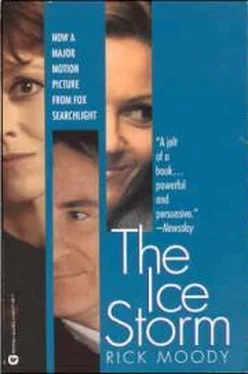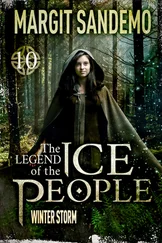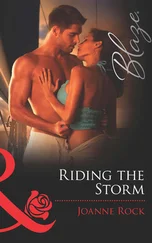Ice everywhere, and icicles, brittle, crunchy snow and ice, through which Benjamin Hood trudged now, falling into ice, rescuing himself, jogging from the ambulance to the exterior of the Williamses’ house. Hood’s face was swollen and pink-orange with embarrassment and anxiety. His progress up what would once have been a flagstone path — he was actually veering across a flower bed now — couldn’t really be called progress. He hustled, he urged his flaccid thighs and calves on, and yet he wasn’t getting anywhere. He was stalled on that walkway, on that flower bed, stretching out his fat, puffy palm toward the front door. No closer.
The sound of radio static coming from the ambulance. Wind rollicking in sugar-coated trees. Reflections. The sound of icicles giving up their form, returning to rivers. The restless movement of water. Wood smoke drifted on the wind and scorched a sad spot in Hood’s heart. Even on this mission, he couldn’t ignore it. The past was so past it hurt — afternoons in duck blinds with his father, northern New England and its bittersweet citizenry. He missed the past and he could have been kinder. He was only ten steps from the front door now; his movements frozen to a crawl. The front of the house: white, orderly, colonial. A flagpole (unflagged), an array of carefully tended shrubs garlanded in ice. Two-car garage. Imitation gaslight beside the front step. Columns. Behind, the hill. Below, the Silver-mine River.
At last, when it seemed a whole day would come and go before Hood reached the Williamses’ door, when it seemed inside to Elena Hood and to the Williamses and to Wendy Hood that the ambulance had pulled into the driveway for a coffee break, or for a morning bird-watching excursion, when it seemed to Janey Williams that she had opened and closed the door a dozen times and each time had found a different day, a different tragedy — a day in which the ambulance drivers were simply asking directions, on their way to some coronary event; a day in which it was just a red station wagon with a flat tire, not an ambulance; a day in which the loss belonged instead to the Hoods and Ben was simply looking for Elena and Wendy — after all these alternatives, the knock came at the door. The door opening, and then the knock. It was all backward.
— Janey. Uh. You and Jim had better come out here for a moment. I’m afraid there’s something…. You’d better come on out here. I… you need to talk to these men. Listen, I—
Then the splash page. The procession was like pipers, like some medieval crew schooled in gymnastic — Janey and Jim Williams launched themselves desperately out into the snow, dressed only in what clothes they wore in the house; followed by little Sandy Williams, who carefully jumped into each of the foot holes his parents depressed in the walkway in front of him, balancing, nearly falling over; followed by Elena, arms folded, shoulders hunched, lips pursed, not knowing why she followed exactly; and then Wendy, snow-blinded by the reflection of light and the sound of water running everywhere; followed by Benjamin Hood himself, now relieved of his responsibility but anguished, knowing. Hood in his galoshes.
The ambulance driver waited for them, slouched against the car. At the same moment, a police car slowed and parked on Valley Road. Two officers emerged and listlessly ambled toward the column of observers.
— Your neighbor here found the body of a young boy over by the hospital, the ambulance driver was saying, mostly to Jim Williams. Says he has reason to believe that the boy is your son. I’m afraid… well, we have attempted to revive the boy and we have failed to do so. To revive him. But we really ought—
Janey Williams’s face — featureless, bland, and then twisted. Tragedy mask, comedy mask, tragedy mask. She smiled, she trembled. She knew, she didn’t know. The year had sprung a leak. Loss surged and waned according to its own itinerary. Janey’s hands were red and importunate, as if she was conducing the scene somehow, waving through its downbeats. She danced and wept and conducted and spoke in tongues.
The ambulance driver let the news sink in, looked down at tracks in the snow — he was an accomplished messenger of ill — and then he went over to seek consel from the police.
— You think it’s okay to let them identify the body? This was all done in asides.
— I’ll take care of it, if you want, the officer said. He moved toward the circle around the ambulance.
— These guys got to move along to the hospital. To make it official. And we’re going to have to get a full report, but first I’ll need to know your names. You know, the usual stuff. And you say your boy has been missing how long?
Distractedly, Jim Williams parted with the information. His answers were blunt, contradictory, imprecise. Ben Hood stepped into the circle and told his story again. The policeman — unconcerned with the usual logistics of Hood’s account — pointed to the ambulance, to the treasure housed there.
— Somebody probably ought to identify, he said. We could do it and get it out of the way. To Jim Williams: You want to come here and have a look?
No, absolutely not. Williams didn’t want to look, to taste that scene. He found himself looking around, ready to suggest almost anybody else. They all watched him swiveling, each of them ready to volunteer. Maybe Sandy ought to have done it, or Janey, though she was far away, back in the past, jousting with all the hurts that were now called up alongside this one. Jim didn’t want to look at his dead son. Fathers shouldn’t have to. It should not have been a configuration of any paternal fate. It was instead the sad responsibility of sons — identifying the dead — a responsibility Jim had already fulfilled in his life. Sons should bid farewell to fathers.
Then Jim Williams, trembling, resigned himself to the duty. He climbed into the back of the ambulance. His cry emerged, long and hoarse and elastic and then muted, choked off. And they could also hear the ambulance driver venturing the probable cause. And they could hear the other two men inside — there was routine conversation. Football scores. Jim climbed unsteadily from the ambulance, a husk.
Williams tried to get out a sentence, an explanation for his family, but each time he was interrupted by the threat of his own speech, now weak, growing fainter. Then no words came forth. He simmered. Elena and Janey took hold of him, one on each arm, and in that way they shivered while the machinations of the state went on around them. Mike was being entered onto statistical rolls.
The driver climbed out again — the driver’s-side door swung shut behind him.
— Okay, we’re gonna have to take, uh, the deceased down to Norwalk. Would one of you like to go along? Don’t need all of you. In fact, it’ll be best if it’s… just one of you. Not going to be much to see now. Best if you just let the process take its course, if you want my advice.
Ben was coming forward to volunteer, but his part in this subplot was done. Jim Williams stepped up again, out of the arms of these two women, out of their generosity, because who else could go? His uncertain, wordless gesture of assent — he raised a single finger, as though he were inconspicuously bidding at an auction — emerged from him without thought. Janey and Sandy and Elena let him go. He climbed into the back of the ambulance, and the driver climbed back into the driver’s seat.
And then the car wouldn’t start. They had run the radio too long. Maybe. Or it was just one of those days. The engine coughed roughly several times, but nothing. Elena heard them swearing inside the ambulance; they had just started it, it had no history of problems.
They jumped the engine off the police car. The state employees stood around scratching their heads, looking for the cables. After a dull, impenetrable quarter hour — Jim getting in and out of the back — ignition was achieved. The police took everyone’s name and number.
Читать дальше












